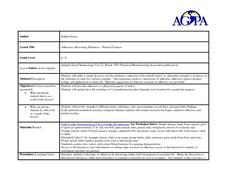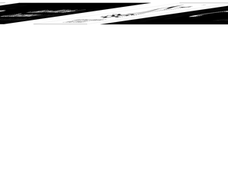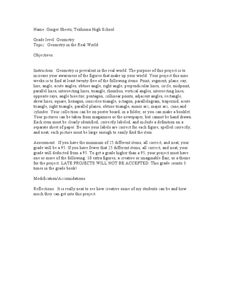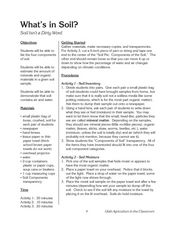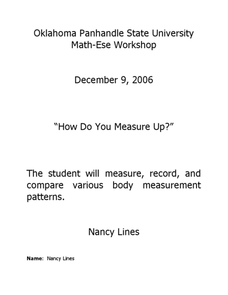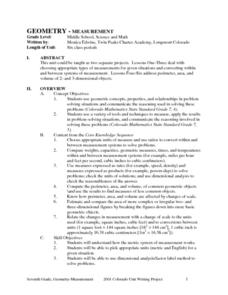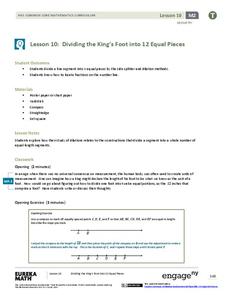Curated OER
Proportionality Using Wind in the Willows
Students examine proportionality in Wind in the Willows by comparing Mr. Toad, objects proportional to him and objects proportional to humans. They then measure a stuffed Mr. Toad and make common objects proportional to Mr. Toad???s...
Curated OER
Where in Our Solar System Are We?
Second graders research distance between planets and the sun using encyclopedias. They use toilet paper sheets as a unit of measurement (50 million km.) students stand at planet locations using toilet paper to measure distance between.
Curated OER
Adhesives: Measuring Stickiness
Students test the stickiness of natural substances. In this adhesion as a property of matter lesson, students build a tool to test the adhesion of natural "glues" such as honey, peanut butter, flour and water paste, and jelly. Students...
Curated OER
Every Square Inch Counts
Students monitor the abundance of organisms in photograph quadrats. In this environmental monitoring lesson, students view pictures of rocky intertidal and subtidal marine zones and discuss the importance of monitoring organism...
Curated OER
Measurement: Perimeter and Area
In this perimeter and area lesson, young scholars learn the formulas for perimeter and area and view model problems using tiles. Students work in groups to solve practice problems. Young scholars define perimeter and area and...
Curated OER
Geometry in the Real World
Eighth graders complete a unit of lessons on basic geometry concepts. They participate in a variety of activities, culminating in a project that involves publishing a booklet or a poster that presents the major geometry concepts from the...
Curated OER
What's in Soil?
Students examine soil samples and make observations. In this soil lesson, students participate in experiments to determine the components (mineral matter, organic matter, water air) in the soil. Students analyze a pie graph on the...
Curated OER
Build a Rain Gauge
Students use a glass container, coat hanger, measuring spoons, and more to make their own rain gauge. In this rain gauge lesson plan students measure the rain.
Curated OER
I Can Use a Worm to Count
Kindergarteners use worms, puppets or other props to practice counting to 100. First, they listen to a read aloud of Count Worms by Roger Hargeaves. A worm pattern is used to count to 100, with each segment of the worm...
Curated OER
Square Roots Using a Carpenter's Square
Middle schoolers calculate the square root of a given number using carpenter's square measurements. In this math instructional activity, students relate this method on the Pythagorean theorem. They answer practice problems after the...
Curated OER
Inches and Feet
In this inches and feet worksheet, students, with a partner, estimate and measure the answers to five word problems dealing with inches and feet.
Curated OER
How Do You Measure Up?
Students explore the concept of measurement, modelling the increments on a standard ruler using cubes and grid paper. They identify the length of a line to a designated standard unit and measure specified body parts.
Curated OER
Measuring With a Ruler
In this home school support worksheet, 2nd graders review the process of measuring with a six inch ruler with a home support person. They practice by measuring small items around the house to the nearest inch.
Curated OER
Measure Twice
Students measure a variety of objects using the appropriate measuring tool. In this measurement lesson, students explain the importance of accuracy and precision in collecting data. They discuss the difference between the two.
Curated OER
Math Problems - Feet and Inches
Pupils examine the terms "feet" and "inches" and discover converting feet to inches, and inches to feet. They then work on the worksheet and solve the problems independently.
Curated OER
Snowmen Measuring Sticks
Students get into small groups and paint their paint sticks white. They then mark off inches on their stick with the help of a partner and inch worms. The teacher will add the hat and the eyes while the students add buttons, a scarf, and...
Curated OER
Measurment (Elementary, Mathematics)
Pupils break into pairs/groups and go outside to find as many things as they can that are EXACTLY 1 inch.
Curated OER
Geometry - Measurement
Students review the procedure for determining appropriate types of measurements for given situations and measurement conversions. They figure perimeter, area, and volume of 2 and 3 dimensional objects.
Willow Tree
Perimeter of Common Geometric Figures
Help learners understand that perimeter and circumference are one in the same. Learners apply their skills to determine the perimeter/circumference of triangles, rectangles, and circles. They then use the same strategy to find the...
EngageNY
Truncated Cones
Learners examine objects and find their volumes using geometric formulas in the 21st installment of this 25-part module. Objects take the shape of truncated cones and pyramids, and individuals apply concepts of similar triangles to find...
EngageNY
Dividing the King’s Foot into 12 Equal Pieces
Apply, apply, apply! A measurement lesson applies a number of concepts to help learn a new construction. Scholars learn to divide a segment into n equal parts using a method that uses the Side Splitter Theorem and a method that...
Virginia Department of Education
Out of the Box
There's no need to think outside the box for this one! Scholars measure the length, width, and height of various boxes. Results help develop the formulas for the surface area and volume of rectangular prisms.
Curated OER
The Circumference of a Circle and the Area of the Region it Encloses
Bring your math class around with this task. Learners simply identify parts of a given circle, compute its radius, and estimate the circumference and area. It is a strong scaffolding exercise in preparation for applying the formulas for...
Virginia Department of Education
Modeling the Big Bang Theory
Young astronomers learn about the Big Bang Theory and redshift through a hands-on activity in the last installment of a three-part series. Participants draw dots on balloons and then inflate them to model how galaxies moved farther apart...


